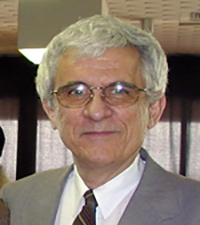
Life isn’t easy in sub-Saharan Africa. An AIDS epidemic, crushing poverty, civil wars, a dearth of economic development and widespread illiteracy are just a few of the hurdles that confront many of the region’s 650 million people each day.
By focusing on connections among those obstacles and their solutions, a Florida State University professor hopes to find a way to help address illiteracy across the subcontinent. Peter Easton, an associate professor of adult education and human resource development in the College of Education, makes the case that promoting adult literacy is a crucial component of effective strategies to address human rights, economic development and health care issues throughout the nearly 50 nations that comprise sub-Saharan Africa.
Easton, a faculty member in FSU’s Department of Educational Leadership and Policy Studies, has just returned from Libreville, Gabon, in central Africa. There, he attended the 2006 Biennial Meeting of the Association for the Development of Education in Africa (ADEA), an organization established by the World Bank in 1988 to foster collaboration and coordination between development agencies and African ministries of education. Easton was no ordinary attendee, however; he was charged with presenting three policy papers, including one titled "Education By All: A Brief for Literacy Investment" that served as the keynote paper for the section of the meeting devoted to literacy.
"It’s certainly an honor to be asked for a keynote presentation," Easton said. "But I’m actually more pleased for a functional reason. Illiteracy remains a massive problem in Africa, but one that can only be successfully addressed with and through solutions to the continent’s other development challenges. Such a visible forum for proposing ways to confront the issue offers real hope of making a difference in the lives of millions of people."
While adult literacy rates have risen throughout Africa, particularly among women, so far they have done so too slowly and unevenly to ensure accomplishment of "Education For All" literacy goals by the year 2015, the target date set by the United Nations. According to ADEA statistics, some countries, such as Botswana, Mauritius and South Africa, have reached adult literacy rates over 75 percent. Others, such as Burkina Faso, Mali and Niger, have yet to reach 20 percent. Overall, during the last decade women’s literacy rates on the subcontinent have risen by 12 percentage points, men’s by eight.
In his keynote paper, Easton offered several major recommendations for effectively promoting adult literacy. Chief among them: urging government ministries, international aid agencies, nongovernmental organizations (NGOs) and others with a stake in improving conditions in sub-Saharan Africa to link literacy efforts with other development initiatives, such as public health extension, agricultural marketing, micro-credit administration and local government, by providing for decentralization of these activities and transfer of authority over them to individuals and communities with the requisite skills.
"Literacy is an essential skill in managing new activities, running local crop markets, administering community government and communicating with constituents," Easton said. "Efforts to promote literacy, then, must dovetail with other local development initiatives that create uses for it and that require it.
"If we can succeed in uniting adult literacy efforts with economic development efforts, then we will have a much better chance of countering some of the other problems that are endemic to this part of the world."
Some 650 participants attended last week’s ADEA biennial congress. (See www.adeanet.org.) They included education ministers from virtually all sub-Saharan nations; representatives of multilateral and bilateral cooperation agencies; leaders of NGOs such as Save the Children, CARE and ActionAid; and educational specialists from universities and research institutions located throughout the African continent and the world at large.
Easton has more than 40 years of experience working in adult education and related fields in the United States, Africa, the Caribbean and Southeast Asia. He lived in the sub-Saharan countries of Niger and Mali for 10 years, traveled extensively throughout the region, and is fluent in Hausa, one of the most commonly used languages in western and central Africa, as well as in French, the administrative language of most Sahelian nations.




